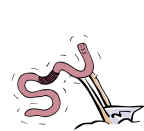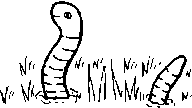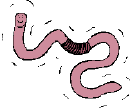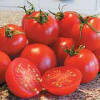|
Not all worms mind, those in the genus Lumbricus to
be precise, the common earthworm. Charles Darwin spent years writing a whole
book about them that ended up hundreds of pages long ("The Formation of Vegetable
Mould Through the Action of Worms") so there must be something more to them
than meets the eye).
 Worms have
helped keep our agricultural system going for centuries. They are a slow silent
plough that turns the soil over. They bring down organic matter from the surface
of the soil and mix it with what lies below. They smooth the landscape. England's
green and pleasant land with verdant rolling pastures is in no short measure due
to the work over countless years of countless earthworms (and the same for Scotland,
Wales and Ireland too). Worms have
helped keep our agricultural system going for centuries. They are a slow silent
plough that turns the soil over. They bring down organic matter from the surface
of the soil and mix it with what lies below. They smooth the landscape. England's
green and pleasant land with verdant rolling pastures is in no short measure due
to the work over countless years of countless earthworms (and the same for Scotland,
Wales and Ireland too).
The presence of worms is an indication of a healthy soil.
Worms have far too much self respect to live in gooey organic deficient muck (muck
as in rubbish, not proper muck as in manure - they love that). As well as enriching
the soil and mixing it worms also aerate it with their movements and the burrows
that they dig.
There are some poor deluded souls who apply vermicides (worm killing
chemicals) to actually get rid of their worms. They consider the casts unsightly.
Worm casts indicate healthy and active worms, your soil couldn't have a better
conditioner. The soil that makes up worm casts is the finest graded material
you could ever wish for. Old recipes for seed compost advise adding worm casts,
an excellent idea if an awful lot of work going around and gathering them.
 If
you have worm casts on your lawn and don't want them, then don't reach for
the chemicals - invest in a besom. A traditional birch broom like a witches broomstick,
use it to scatter the casts, you could just use a bamboo cane or even your foot.
But please don't damage the worms, they really are your garden's friend.
It's just a shame that they're not cute and furry with big soulful eyes. If
you have worm casts on your lawn and don't want them, then don't reach for
the chemicals - invest in a besom. A traditional birch broom like a witches broomstick,
use it to scatter the casts, you could just use a bamboo cane or even your foot.
But please don't damage the worms, they really are your garden's friend.
It's just a shame that they're not cute and furry with big soulful eyes.
Worm Info
  Worms are the great recyclers. It has been estimated that if there was no
natural decay, then since Elizabethan times the world would be about 1 kilometer
deep in dead leaves and faeces!
Worms are the great recyclers. It has been estimated that if there was no
natural decay, then since Elizabethan times the world would be about 1 kilometer
deep in dead leaves and faeces!
 Worms will only start on your compost heap after the initial heating phase is over.
They couldn't survive in the temperatures that are initially reached by the
action of bacteria and fungi, but will finish off the compost admirably to give
a rich brown crumbly end result (as long as it's not a sticky horrible mess
- see "how to make compost
that would gladden the hearts of a worm"
Worms will only start on your compost heap after the initial heating phase is over.
They couldn't survive in the temperatures that are initially reached by the
action of bacteria and fungi, but will finish off the compost admirably to give
a rich brown crumbly end result (as long as it's not a sticky horrible mess
- see "how to make compost
that would gladden the hearts of a worm"
 Worms have 5 pairs of hearts.
Worms have 5 pairs of hearts.
 Good healthy worm friendly soil can have up to 700 worms per square meter.
Good healthy worm friendly soil can have up to 700 worms per square meter.
 Earthworms
comprise a major food source of many animals for example moles, foxes, badgers
and thrushes.
Earthworms
comprise a major food source of many animals for example moles, foxes, badgers
and thrushes.
 If you accidentally chop a worm in two while working in the garden, you
get two dead bits (after the nerves have stopped firing) and not two new worms.
If you can bring yourself to do it, put these chopped bits on the surface so that
the birds watching you can eat them.
If you accidentally chop a worm in two while working in the garden, you
get two dead bits (after the nerves have stopped firing) and not two new worms.
If you can bring yourself to do it, put these chopped bits on the surface so that
the birds watching you can eat them.
 Soil churning can be demonstrated by placing earthworms in a container
that has the bottom half filled with sand and the upper half with potting soil.
Five worms will thoroughly mix 500 ml of sand with 500 ml of soil within several
months. Give them some dead leaves to eat and keep the mix moist.
Soil churning can be demonstrated by placing earthworms in a container
that has the bottom half filled with sand and the upper half with potting soil.
Five worms will thoroughly mix 500 ml of sand with 500 ml of soil within several
months. Give them some dead leaves to eat and keep the mix moist.
 Keep a look out for the New Zealand Flatworm. These are superficially like
earthworms but darker on top with a paler margin, underneath they are pale yellow
flecked with brown. They are about 12-20cm in length and feed on earthworms. In
parts of Northern Ireland and the Faroe Islands these accidental tourists have cleared
areas of pasture land of earthworms completely, they are a potential ecological
disaster. They have been around in Britain since at least 1965, although they have
been found as far south as Portsmouth, they are largely confined to Scotland and
the North at the present.
Keep a look out for the New Zealand Flatworm. These are superficially like
earthworms but darker on top with a paler margin, underneath they are pale yellow
flecked with brown. They are about 12-20cm in length and feed on earthworms. In
parts of Northern Ireland and the Faroe Islands these accidental tourists have cleared
areas of pasture land of earthworms completely, they are a potential ecological
disaster. They have been around in Britain since at least 1965, although they have
been found as far south as Portsmouth, they are largely confined to Scotland and
the North at the present.
Please help the research into these
aliens by reporting any sightings to:
Brian Boag, Scottish Crop Research Institute,
Invergowrie, Dundee. Scotland DD2 5DA. Tel. 01382 562731 Fax. 01382 562426 Email:
bboag@scri.sari.ac.uk
 Captive worms have been known to live for 6 years, though wild ones probably
don't fare any where near as well. They reach sexual maturity after 6 to 12
months.
Captive worms have been known to live for 6 years, though wild ones probably
don't fare any where near as well. They reach sexual maturity after 6 to 12
months.
|








 Worms have
helped keep our agricultural system going for centuries. They are a slow silent
plough that turns the soil over. They bring down organic matter from the surface
of the soil and mix it with what lies below. They smooth the landscape. England's
green and pleasant land with verdant rolling pastures is in no short measure due
to the work over countless years of countless earthworms (and the same for Scotland,
Wales and Ireland too).
Worms have
helped keep our agricultural system going for centuries. They are a slow silent
plough that turns the soil over. They bring down organic matter from the surface
of the soil and mix it with what lies below. They smooth the landscape. England's
green and pleasant land with verdant rolling pastures is in no short measure due
to the work over countless years of countless earthworms (and the same for Scotland,
Wales and Ireland too). If
you have worm casts on your lawn and don't want them, then don't reach for
the chemicals - invest in a besom. A traditional birch broom like a witches broomstick,
use it to scatter the casts, you could just use a bamboo cane or even your foot.
But please don't damage the worms, they really are your garden's friend.
It's just a shame that they're not cute and furry with big soulful eyes.
If
you have worm casts on your lawn and don't want them, then don't reach for
the chemicals - invest in a besom. A traditional birch broom like a witches broomstick,
use it to scatter the casts, you could just use a bamboo cane or even your foot.
But please don't damage the worms, they really are your garden's friend.
It's just a shame that they're not cute and furry with big soulful eyes.